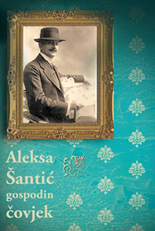

In May 2011, Luka Praha o.s. published a bilingual edition of poems by Aleksa Šantić as part of its Slavic South to Czech Friends Series. The anthology of 74 poems was compiled by the Bosnian-Herzegovinian poet Stevan Tontić and the poems were translated by Ludvík Kubišta in cooperation with Irena Wenigová. The anthology also includes a number of extracts from Písně otroka (Poems of a Slave) by the Czech poet Svatopluk Čech, also in a bilingual version. They were translated into Serbo-Croatian in 1919 by Aleksa Šantić himself as the poet was deeply interested in the Czech language and literature. The book also includes a DVD with the 1991 film Moj brat Aleksa (My Brother Aleksa) by director Aleksandar Jevdjenić. Besides its launch in the Czech Republic we are planning to present the publication in Mostar where we would like to plant a small birch avenue as a commemoration of the great poet Aleksa Šantić. The collection of poems was also presented at the 56th International Book Fair in Belgrade on October 28th 2011.

Editor-in-Chief: Veso Djorem
Editors: Stevan Tontić, Irena Wenigová, Ludvík Kubišta; Graphic Designer: Bogdan Jovanović
General Partner: SLOT Game, a.s. Aidy a Milutina Perićových
Partner: Restaurace Luka Lu
(May, 2011)
Aleksa Šantić (1868–1924) is without a doubt one of the greatest Bosnian-Herzegovinian, Serbian as well as Yugoslav poets. He was born in 1868 in the town of Mostar where he also spent most of his life. After attending business schools in Trieste and Ljubljana he returned to his native Mostar. His creative period includes the end of the 19th and beginning of the 20th century. His most beautiful poems were written between 1905 and 1910. He was most influenced by the Serbian poets Vojislav Ilić and Jovan Jovanović Zmaj, among foreign authors he respected Heinrich Heine whose works he translated into Serbo-Croatian. Šantić’s poems reflect innermost pain, patriotism, erotic desire and a revolt against national and social injustices. A founder of the cultural review “Zora”, Šantić also contributed to a number of other literary magazines. As of 1914 he was a corresponding member of the Serbian Royal Academy. During his life he wrote a great number of poems, most of which are still “alive” today and most likely will continue to live on in popular knowledge. His best-known poems include “Emina” (1903), “Ne vjeruj” (Don’t Trust, 1905), “Ostajte ovjde” (Stay Here, 1896), “Pretprazničko veče” (On the Eve of a Holiday, 1910), “O klasje moje” (Oh, my Ears of Corn, 1910), “Moja otadžbina” (My Fatherland, 1908). The famous poet died of tuberculosis on February 2nd in his native Mostar.
May his name endure forever!